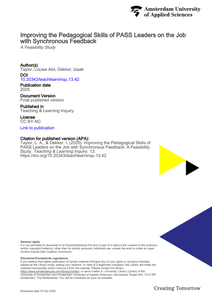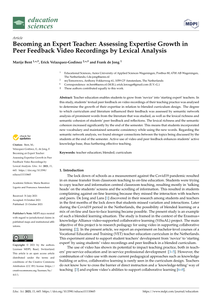From the article: "Whilst the importance of online peer feedback and writing argumentative essays for students in higher education is unquestionable, there is a need for further research into whether and the extent to which female and male students differ with regard to their argumentative feedback, essay writing, and content learning in online settings. The current study used a pre-test, post-test design to explore the extent to which female and male students differ regarding their argumentative feedback quality, essay writing and content learning in an online environment. Participants were 201 BSc biotechnology students who wrote an argumentative essay, engaged in argumentative peer feedback with learning partners in the form of triads and finally revised their original argumentative essay. The findings revealed differences between females and males in terms of the quality of their argumentative feedback. Female students provided higher-quality argumentative feedback than male students. Although all students improved their argumentative essay quality and also knowledge content from pre-test to post-test, these improvements were not significantly different between females and males. Explanations for these findings and recommendations are provided"
MULTIFILE

While feedback is frequently emphasized as a crucial principle of presentation courses in higher education, previous studies revealed that teachers outperform peers in terms of impact on students’ development of oral presentation competence. Further, presentation research showed that the lack of quality of peer feedback can be considered as an essential argumentation for the identified differences in effect. Follow-up field experiments demonstrated that Virtual Reality (VR) can be considered as a valuable alternative feedback source for developing public speaking skills, since this technology is able to simulate real-life presentation situations as well as to deliver feedback from the VR system to the individual learner. Recent technological developments allowed to convert quantitative information from VR systems into qualitative feedback messages that directly relate to the standards for high-quality feedback. If students are able to individually interpret the feedback messages without the intervention of a human feedback source, it could enrich the quality of feedback in peer and self-learning and further increase students’ oral presentation competence development. This chapter provides a synthesis of the literature in presentation research with the aim to construct a research agenda on computer-mediated feedback in VR for peer learning in this field. Further, two recent VR experiments in presentation research are discussed with the aim to effectively construct feedback messages in VR for improving peer learning.
LINK
De Hogeschool Utrecht heeft een experiment uitgevoerd om het curriculum van de Pabo te flexibiliseren, zodat het beter aansluit op de leerbehoeften van studenten. Dit project richtte zich op het verbeteren van zelfregulatie door middel van ontwikkelingsgerichte feedback. In twee nieuw ontworpen cursussen werd programmatisch toetsen toegepast, waarbij feedback centraal stond dat werd vastgelegd in het digitale portfolio Scorion. Studenten verzamelden bewijsmateriaal in dit systeem, waarop verschillende feedbackgevers feedback gaven. Daarnaast werden studenten in kleinere leerteams begeleid en getraind in feedbackgeletterdheid, wat hen hielp om feedback beter te begrijpen, te gebruiken en erop te reageren. De resultaten van het project toonden aan dat het mogelijk is om onderwijs en toetsing zodanig te ontwerpen dat studenten meer regie krijgen over hun leerproces. Het project biedt een solide basis voor verdere ontwikkeling en verbetering van het onderwijsprogramma.
MULTIFILE

Peer assisted study sessions (PASS), also known as Supplemental instruction, are structured peer guided sessions linked to a specific course, led by experienced and trained students called PASS-leaders. These PASS-leaders undergo several days of training before running their first session and receive supervision and feedback ‘on the job’. Research suggests that training improves student outcomes whereby supervision is considered best practice, as required by PASS protocols. However, it is unclear what type of supervision best supports PASS-leaders. Thus far, studies have not compared different methods for on-the-job interventions. Current practice involves supervisors observing PASS sessions without intervening but providing post hoc feedback. While this prevents undermining the PASS leaders, it delays their ability to act on feedback immediately. This study, carried out at an institution for initial teacher education, developed and tested a method for providing immediate feedback using a bug-in-ear device linked to a live-stream. Six PASS-leaders were observed during 4-6 sessions each, receiving either synchronous feedback with a bug-in-ear or in-person asynchronous post hoc feedback. In group interviews PASS-leaders reported appreciating the immediacy of synchronous feedback which allowed them to act on it in real-time. The surveys after each lesson indicated that they felt significantly more confident about teaching following live feedback. They described the supervisor as an invisible helper, providing support or assistance. Because the bug-in-ear method could only provide feedback on visible instructional and pedagogical actions, both PASS-leaders and PASS-supervisors recommended using this as a supplement to a pre-session briefing and a post-session debrief.
DOCUMENT

This study provides an illustration of a research design complementary to randomized controlled trial to evaluate program effects, namely, participatory peer research (PPR). The PPR described in current study was carried out in a small sample (N = 10) of young adults with mild intellectual disabilities (MID) and severe behavioral problems. During the PPR intervention, control and feedback to individuals is restored by training them to become participant-researchers, who collaborate in a small group of people with MID. Their research is aimed at the problems the young adults perceive and/or specific subjects of their interest. The study was designed as a multiple case study with an experimental and comparison group. Questionnaires and a semistructured interview were administered before and after the PPR project. Results of Reliable Change Index (RCI) analyses showed a decrease in self-serving cognitive distortions in the PPR group, but not in the comparison group. These results indicate that PPR helps to compensate for a lack of adequate feedback and control, and in turn may decrease distorted thinking and thereby possibly later challenging behavior.
DOCUMENT

Our research aims to formulate design guidelines for stimulating teachers' professional development using video feedback in collaborative settings. The study investigates guidelines concerning video feedback in peer coaching settings and focuses on a setting with three roles (of trainee, coach and observer), (c) coach training, (d) ownership of learning goals and (e) focus on outcomes in classroom. A scheme was developed consisting of six coach training sessions and of peer reciprocal coaching in subgroups with video feedback of classroom performances. Within these subgroups three teachers took turns in different roles: as trainee, as coach and as observer of the coaching dialogue. The study explores the coach's roles that are beneficial for the learning process of their peers and seeks to understand how watching video records of own practice supports teachers to examine their own professional behaviour in new ways. Data for this study includes videotaped and transcribed subgroup dialogues and, for triangulation, data from learning reports, audio tapes and observational notes of the training sessions, questionnaires, and in-depth semi-structured interviews with all participants. Coaching in a setting with three well defined roles (trainee, coach, observant) proved valuable. The coach role was very important for the depth of the reflection process. Non-directive coaching skills created necessary safety and space for learning, but more directive coaching skills such as 'Continue to ask questions' were necessary to deepen the reflection process from more descriptive and perceptive reflections to more receptive, interactive and critical reflections. In the dialogues the participants reflect on practice, on context, on values, and on improvements. Working with (peer) observers of the coaching dialogs improved performance and forced the group to take their roles more seriously. Essential for the scheme to work is a high degree of equality between participants.
DOCUMENT
The first year of study is very exciting for many students. Everything is new: the school, your schedule, the teachers, and your fellow students. How can a university ensure a smooth transition for first-year students? For this, Inholland launched the Students for Students (S4S) project in the 2019-2020 academic year. In this project, second-year students (studentcoaches) support first-year students with their studies. They do this based on their own experience and the training they receive during their year as studentcoaches. Research shows that peer-mentoring is very successful in aiding first-year students through their first year of the study program. Peer-mentoring has the potential to increase well-being, social bonding, the feeling of belonging, and student resilience. It also ensures smoother academic integration, as peer-mentoring focuses on developing academic skills as well. Additionally, a studentcoach is often a low threshold point of contact for students where they can go with questions.
DOCUMENT

Teacher education enables students to grow from ‘novice’ into ‘starting expert’ teachers. In this study, students’ textual peer feedback on video recordings of their teaching practice was analysed to determine the growth of their expertise in relation to blended curriculum design. The degree to which curriculum and literature influenced their feedback was assessed by semantic network analysis of prominent words from the literature that was studied, as well as the lexical richness andsemantic cohesion of students’ peer feedback and reflections. The lexical richness and the semantic cohesion increased significantly by the end of the semester. This means that students incorporated new vocabulary and maintained semantic consistency while using the new words. Regarding the semantic network analysis, we found stronger connections between the topics being discussed by the students at the end of the semester. Active use of video and peer feedback enhances students’ activeknowledge base, thus furthering effective teaching.
DOCUMENT

De Peer Support Group Kwalitatief Onderzoek van de HU is een groeiende, zelfsturende, HU-brede groep die is ontstaan uit de behoefte van onderzoekers en docenten om als ‘peers’ onderling kennis en ervaring te delen met betrekking tot kwalitatief onderzoek. De logistiek en organisatie van deze groep heeft een zeer fluïde karakter. Zij vormt zich naar de inhoudelijke en organisatorische behoeften van de groep. Deze behoeften zijn continu in beweging door onder andere veranderingen binnen de organisatie van de HU en de verschillende werkvelden en onderzoeksdomeinen waaruit de deelnemers afkomstig zijn. Maar ook door de ontwikkelingen die plaatsvinden op het terrein van kwalitatief onderzoek, binnen de eigen Peer Support Group (PSG) zelf en van de individuen die deel uitmaken van de PSG. In deze bijdrage zal ik nader uiteenzetten hoe complexiteit een rol speelt in het ontstaan en functioneren van de PSG.
DOCUMENT

Just what and how eight experienced teachers in four coaching dyads learned during a 1-year reciprocal peer coaching trajectory was examined in the present study. The learning processes were mapped by providing a detailed description of reported learning activities, reported learning outcomes, and the relations between these two. The sequences of learning activities associated with a particular type of learning outcome were next selected, coded, and analyzed using a variety of quantitative methods. The different activity sequences undertaken by the teachers during a reciprocal peer coaching trajectory were found to trigger different aspects of their professional development.
DOCUMENT
